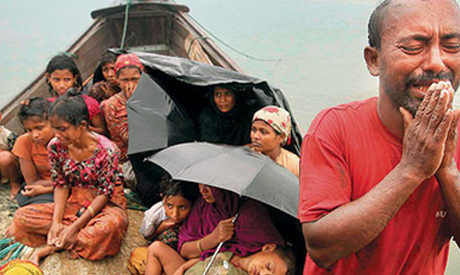Responsible for Equality And Liberty (R.E.A.L.) has become aware of a new human rights report on the ongoing human rights crisis of Rohingya Muslims, which indicates that the Myanmar state security forces are “complicit in and profiting from” human trafficking of Rohingya Muslims refugees, seeking to flee from violence and persecution.
On November 7, 2014 the Fortify Rights group reported, “Myanmar state security forces are complicit in and profiting from the increasingly lucrative maritime human trafficking and smuggling of Rohingya Muslims from Myanmar’s Rakhine State, Fortify Rights revealed in a briefing released today. Since 2012, Myanmar state security forces in Rakhine State have collected payments from Rohingya asylum seekers fleeing Myanmar by ships operated by transnational criminal syndicates, according to information obtained by Fortify Rights. In some cases, the Myanmar Navy escorted boats operated by criminal gangs out to international waters.”
“Local Rohingya brokers mostly deliver payments to members of the Lon Thein riot police, Myanmar Police Department, Navy, and Army in amounts ranging from 500,000 kyat ($500 USD) to 600,000 kyat ($600 USD) per shipload of Rohingya asylum seekers in exchange for passage out to sea. In one case documented by Fortify Rights, the Myanmar Navy demanded 7-million kyat ($7,000 USD) from a criminal gang operating a ship filled with Rohingya fleeing to Malaysia. In other cases, members of the Myanmar Police Department took up to 15,000 kyat ($15 USD) per person directly from individual Rohingya passengers.”
“From September 2013 to October 2014, Fortify Rights interviewed more than 90 Rohingya men and women in Myanmar, Thailand, and Malaysia, many of whom fled the country between 2012 and 2014. Thousands more have fled in recent weeks.”
“Tens of thousands of Rohingya in Rakhine State are now preparing to board 50-to-100-person occupancy boats on the western coast of Myanmar. These boats transport Rohingya asylum seekers to larger ships in the Bay of Bengal that hold as many as 1,000 people. The vast majority of Rohingya who depart by sea soon find themselves in the custody of abusive human trafficking and smuggling gangs, who detain them in conditions of enslavement and exploitation.”
“Most Rohingya are fleeing persecution in Myanmar. Before boarding ships, they are generally not fully informed and, in many cases, are deceived about the treatment they will endure, additional costs, and other aspects of the journey to Malaysia. Many are sold multiple times and for a myriad of reasons, including for labor and sexual exploitation. Nearly all endure or witness torture, deprivation of food and water, confinement in extremely close quarters, and other abuses throughout their journey.”
“In 2012, civilians and state security forces razed Muslim villages in 13 of 17 townships in Rakhine State. More than 300,000 people — predominantly Rohingya Muslims — are now in need of humanitarian aid in the state, according to the United Nations Office for the Coordination of Humanitarian Aid. That includes 70,000 ‘food insecure’ people, 50,000 living in isolated villages, 50,000 in ‘host communities,’ and approximately 140,000 Rohingya and non-Rohingya Muslims living in more than 80 internally displaced person (IDP) camps. More than 100,000 Rohingya reportedly fled the country by sea in the last two years. Rakhine Buddhists also endured casualties and displacement in Rakhine State in 2012 on a lesser scale.”
“Scores of Rohingya who were displaced in Rakhine State told Fortify Rights that inadequate food, health care, and livelihood opportunities in the IDP camps as well as restrictions on movement and fear of future persecution contributed to their decision to flee Myanmar.”
“Moreover, more than 1 million Rohingya continue to be directly affected by persecutory state policies restricting their movement, marriage, childbirth, and other aspects of everyday life in Rakhine State. Rohingya who were not displaced by attacks in 2012 but still face persecution told Fortify Rights that they fled the country due to restrictions imposed by the state, including restrictions on freedom of movement, threats of violence, and ongoing pressure to abandon their ethnic identity.”
Fortify Rights’ report calls for action on Myanmar for the Trafficking in Persons (TIP) report by the U.S. Department of State.
“Trafficking in persons is prohibited under international law, and states have a duty to take action to combat trafficking. Human trafficking includes elements of deceit, exploitation, and abuse. Human smuggling, on the other hand, involves a ‘client’ consenting and paying to be transported across an international border.”
“In June 2014, Myanmar maintained its place on the United States Department of State’s tier-two watch list in the annual Trafficking in Persons (TIP) report. Myanmar has remained on the tier-two watch list through a system of waivers. Unless demonstrable changes take place in the next year, the country could be downgraded to tier-three status — the lowest designation reserved for countries failing to adequately combat human trafficking.”
